#witchcraft theory
Text
Digital Divination: Preliminary Thoughts & Personal Theories
If you've been following the last week or so, you may have seen me ranting about questions regarding digital divination. I've been fascinated with divination since I was a teenager, and now I've got a handful of personal theories and UPGs that I definitely take for granted. It's been a long time since I've asked the whys and hows of divination.
Time to go back to square one.
But if I'm going to dive into what makes divination work and, therefore, why digital divination does or doesn't work, I ought to start with what I know. Or, rather, what I think. So, we start with my personal theory.
*cracks knuckles*
Why does divination work in the first place?
I suppose it depends on what you're using it for. Some use it to literally divine the future. Others see divination as a tool for self-reflection or as a meditative focus. Others still seem somewhere in between, using it as a introspective tool to help with decision making based off of what is already known.
I fall somewhere between the "true" diviners of the future and the introspective tool users. In my opinion, divination (especially tarot) is best used as an assistant and self-improvement tool. I believe divination can predict the future… sort of.
It isn't perfect. That's certain. My existing running theory on why divination works has to do with the interconnectivity of all things, and this is why it works both ways, depending on the diviner's goals. It's either that, or the diviner is specifically requesting messages or assistance from a spirit, who guides their attention and tools toward the appropriate answers.
In the case of interconnectivity, the diviner essentially "taps into" those connections. This doesn't necessarily have to be via meditation or trance. For me, I rarely need to do either. It does require a focus, though, which I suppose could be construed as a trance-like state. The process involves reaching out for the connections and following them to draw conclusions.
In the case of spirit communication or receiving messages, it works somewhat similarly. I don't think that spirits can directly, tangibly affect the physical world we exist in. I do think they can manipulate connections like we can (and sometimes with greater effectiveness or power). So rather than a spirit shuffling and literally pulling the cards for you, they might tug on a connection to your hands and make a card fly out, influence you to stop shuffling at a certain point, tug on the strands surrounding a pendulum to make it swing, etc.
This all ties in with my personal views on fate and faith and free will, which... I may talk about at some point. For now, *handwaves us onwards*.
But Aese, you offer tarot readings all the time. You even take money for tarot readings! Don't you think they can predict the future? I hear you ask, very hypothetically.
Yes! And also, no.
According to my theory, it isn't so simple. There are countless winding, interconnected paths weaving into a blurred future which hasn't taken shape yet. Though I believe in fate (*noncommittal handwiggle with accompanying ehhhhh, it's complicated noise*), the willful interference of humanity and spirits in the world reshapes the future constantly.
At its core, divination is a connection to the inner self, the subconscious. It's through this connection, branching outwards into the world, that we're able to divine.
There is no way to be 100% positive about an outcome. There is always a chance that something will change and alter the situation and, therefore, the future. Nothing is set in stone until it happens. This is why you'll get divinatory readings that resonate really strongly but which don't come to pass.
The goal with divination shouldn't be to obtain certainty. It should be a tool to observe the present and determine the most likely outcomes. It's a decision-making assistant. Is it often correct? When I do it, yes. But that's because I'm specifically pulling for the most likely outcome. Without severe interference (and sometime accounting for it), I find a rather consistent success rate.
For this reason, I don't like yes/no questions. The answer is almost always going to be "maybe." People don't particularly like that, especially people who don't do divination themselves.
I also immediately distrust any diviner who espouses a 100% accuracy guarantee when predicting the future (unless, of course, it's hyperbole for advertising or humor purposes). I definitely believe there are those whose accuracy rates are extremely high and who have a certain skill with divination. They deserve to be proud of their skills. Hell, I'm proud of my skills.
But no one will ever be 100% accurate all the time. You would have to account for every tangent, every twist, every interference to be perfectly accurate. And to do that would take so much time, effort, and skill that it would be prohibitively expensive and/or a ridiculous waste. Just go live your life. Yeesh.
But none of this mentions tools. None of my existing theories require that I have a firm connection to a tool. I've picked up a new tarot deck and had spectacular success without practice or "seasoning" it.
So why, then, doesn't digital divination work for me?
I don't know! I have absolutely no idea. It could be because of my personal connection to the medium, it could be unfamiliarity, it could be that I just don't like it and so it doesn't work. It could be a preconception that it won't work, and therefore, it ends up inaccurate. Not a clue!
Yet.
My next steps are going to be compiling other theories on why divination works. I want to have as wide a net to cast as possible so that I can test multiple theories at once. Then, I'll hunt down as many apps, websites, and various online tools as I can to test, dig through reviews, decide which ones to use, and then get down to it. It's the scientific method, baby! Hypothesis, experiment, record results, do it again.
If you have thoughts, theories, or want to yell about divination with me, feel free to add a comment or reply or send me an ask. I'm going absolutely feral about this and would love to chat about it!!
If you like my work and want to throw a couple dollars my way via Ko-Fi, it would be much appreciated! This research is going to be mostly public for exposure and interaction, but there may be behind-the-scenes notes and more in-depth UPG stuff that'll be Ko-Fi exclusive. Plus, even one-time supporters get extra and early stuff all the time!
#tarot#divination#divination witch#witch#witchblr#witchcraft#witch community#witchy discussion#digital divination#divination theory#witchcraft theory#aese speaks#this is your Bonus Tuesday Post! Free of charge! :)
12 notes
·
View notes
Text
hey! can i use rose leaves like i can petals? do they have different properties?? im drying out rose leaves right now and im wondering if i can do anything with them <333 thanks!!!
#witchblr#witch questions#witchy question#witchy things#beginner witch#experienced witch#witchcore#witches of tumblr#witchcraft theory#witch
7 notes
·
View notes
Text
Priority time, folks: TikTok witches being kinda shallow with their craft is a threat to no one. TikTok witches spreading recycled Satanic Panic/NWO conspiracy theories is a threat to everyone.
7K notes
·
View notes
Text




Credit:unknown
#fyppage#darkness#moon photography#astronomy#astrophotography#outer space#space aesthetic#space photography#james webb deepest sharpest view of universe#saturn#planets#stars#star girl#expanded universe#big bang theory#nasa#orbit#vampire#witchcraft#darkcore#witchythings#dark moon#moon#moon rising#astrology#scifi#science#cosmic#magic#milky way
519 notes
·
View notes
Text
Elemental Work Crash Course
Hello friends! As a west witch I find myself in a lot of elemental spaces, but as an elemental pagan I feel like we get little to no representation without wicca being present so this post is for all my friends who may be looking into elemental work and want to know what to expect! This is an introductory post so if anyone is interested in further information let me know in the comments!

Earth
Common Lessons tend to include grounding, understanding your place within it all like your social circles, life itself, or even the ecosystem. People also tend to find out how to see beauty even when they feel there is none, home and hearth magic, generational magic, and harnessing your own power. Its important to recognize earth is extremely giving, often giving things without expecting anything in return. Remember to give back to the earth when you can in your practice, it isn't fair to take things without giving back. Eventually earth takes all things back from the living, so remember that earth is as powerful as she is kind
Darker Aspect/Element: Rot
How to honor and find these teachings:
Going out in nature
Taking care of plants
Herbal work
Community service
Exploring
Grounding and meditation outdoors
Connecting to earth itself
Evaluating what it means to be human
Common forms of divination
Osteomancy (Burning Bones)
Abacomancy (Dirt)
Dendromancy (Tree reading)
Falling petals or leaves
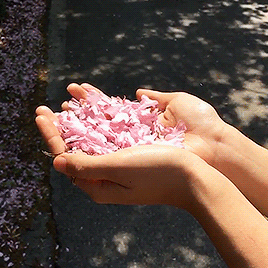
Air
Common lessons from air tend to be quick and ever present, air speaks rather quickly to people and messages change! Its best to keep a log of signs and messages you receive because it tends to be a pebble trail on your journey. Air teaches how to keep calm in tense situations, creating your own path on the journey of life, going with the wind and learning to not value materialistic lifestyles, plus learning how to be more gentle with yourself and others!
Darker Aspect: Tempest
How to honor and find these teachings:
Breath work
Spontaneity and leaving your comfort zone
Living to the fullest (however that might look for you!)
Dance or Hand motions
Meditations
Keeping sword or athame imagery as a talisman
Storm tracking
Common forms of divination:
Smoke Scrying
Wind Watching
Electromancy (By Lightning)
Austromancy (By Clouds)

Fire
Common lessons in fire encourage you to listen closely and not rely so much on searching for messages. In most mythos fire speaks once per session, when its burnt out usually the message is over. Fire teaches us how to be confident in our work, ambition, and performance. Fire likes to throw a lot at you and teach you adaptability, and most importantly how to be the best you can be. You can learn a lot from just a little flame.
Darker Aspect: Magma
How to Honor these teachings:
Practicing Confidence
Glamour Magic
Using your backbone/saying no more
Making friends in odd places
Hosting bonfires/tending to a hearth fire
Using candle magic
Common forms of divination:
Fire Scrying
Candle/Wax reading
Flame Shape reading
Casting knives

Water
Common lessons range depending on what you are looking for! Water can teach you how to be calm and collected, but also encourages you to be fluid! so if you need to unleash the flood you know when its appropriate to do so. You also learn how to go with the flow, how to be persistent, and how to be a fierce enigma. Water is also very humbling at times, so you will learn a lot about yourself.
Darker Aspect: Abyss
How to honor these teachings:
Emotion based meditations
Shadow work
Being in tune with yourself
Swimming
Boating
Fishing
Beach cleanups
Exploring your waterways
Common types of divination:
Water scrying
Waves
Rainfall
Storm tracking
Mist/Dew
#elements#elementals#pagan witch#witchblr#witch#magical theory#grimoire#witchcraft#culturalexploration#divination#paganism#paganblr#pagan#earth#air#fire#water#spells
104 notes
·
View notes
Text
The reason we put protective spells over doors and windows is because they're designated points of entry for energy in all forms. That's the spot that allows flow.
Ever wonder why you typically don't enchant a wall the same way?
A wall is built with eons upon eons of intention to keep undesirable things out. Inclement weather, those who would do harm, etc. A symbol almost as old as humanity itself, reinforced with tradition & belief, creating a near impenetrable spiritual barrier between the inside & outside.
Prime example of how weaving the practical into spellwork will make a bigger impact in your magic/k.
Go forth & get weird
#witchcraft#witch#magick#witchy#magic#pagan#baby witch#spell#paganism#witchblr#symbolism#protection magic#protection spell#protection#magickal theory#magical theory
553 notes
·
View notes
Text
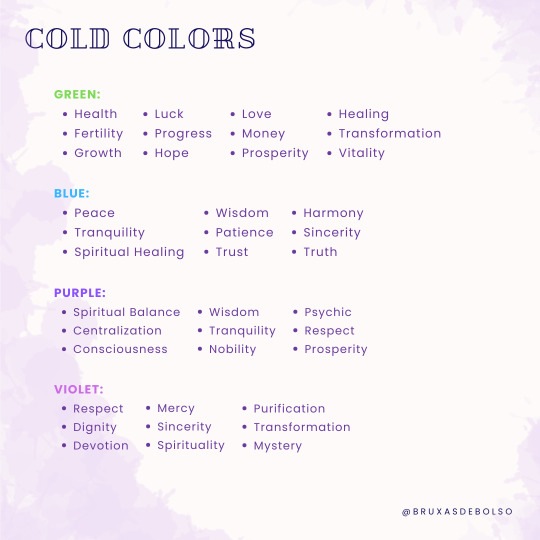
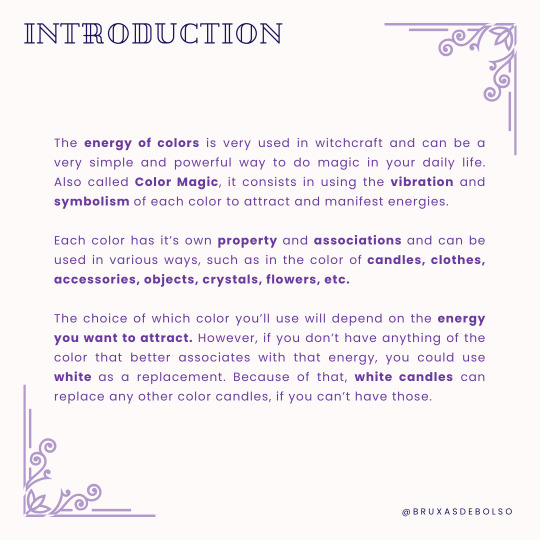
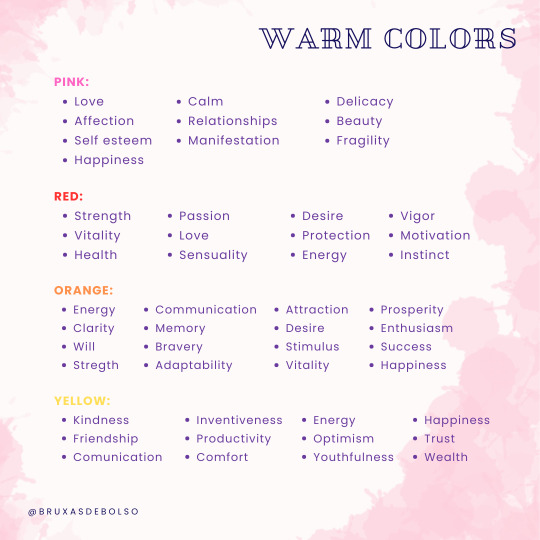

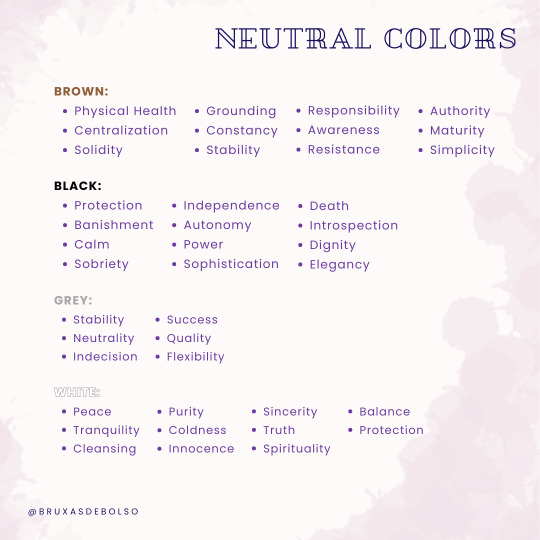
#witch#witchblr#witchcraft#witches#witches of tumblr#beginner witch#studyin witchcraft#tips#witchy tips#witchy#color#color magic#color magick#chromatic wheel#color theory#color therapy#magic#magick
62 notes
·
View notes
Text
A Pocket Full of Posies and WTF is up with Rollo's Hankie

Before we begin, a slight disclaimer: yes, Medieval beliefs about disease and how it spread were weird. They did not have the ability to know about germs because those are literally microscopic and germ theory would not be "discovered" until the 1860s. THIS DID NOT MEAN THEY WERE STUPID AND IF I SEE YOU SAYING THAT WE WILL FIGHT. Anyway-
If you have been kicking around on the internet for a bit, chances are you might have heard the "dark history" fact that that the "Ring Around the Rosey" nursery rhyme is about the Black Plague. That's probably not true but the reason it was originally theorized to be the case has to do with Miasma theory, and the use of strong scents (typically herbs and flowers) to ward off the "bad air." What does this have to do with Rollo huffing that handkerchief every time someone talks about magic? Well we'll get there but first just what the hell do I mean by bad air?
Miasma Theory in Practice
The Black Death/Bubonic Plague was a roving pandemic that gets it's name from the first wave that bitch slapped Europe from 1347-1351. There were technically three forms of plague kicking around by I am not a scientist and we are here to talk about that. Given that this was, as stated in the disclaimer, pre-germ theory the ideas people had about why this was happening and how to prevent it wildly varied, but Miasma Theory was so popular it actually stuck around long enough to duke it out with Germ Theory when scientists started talking about that.
The basic idea is that diseases like the Black Death were spread from bad smelling air. This theory was proposed by Hippocrates, as in that guy from third or fourth century Greece we aren't even sure existed, but it was a pretty universal belief, we have sources from Ancient China that also reference the idea that bad smells can make you sick. This "bad air" was thought to come from decay; in the case of the plague, dead bodies were believed to have released it (hence all the "bring out your dead" stuff), as were cracks in the earth, and sewage. ALL AIR WAS THOUGHT TO HAVE A LEVEL OF MIASMA, but smell was the best way to tell if you were in danger of getting sick; basically if it smells like shit out then you are in danger because there is only so much of it you can breathe in before you get sick. So when you end 1351 with 40% (that we can confirm!) of the population dead, how exactly do you keep yourself from huffing in all that invisible miasma?
Roi du Mouchoir
Well you make the air you breathe smell nicer of course! And this is where we get to Rollo's hankie.
The "posies" in that nursery rhyme doesn't actually refer to one specific flower. It's a type of small bouquet, which apparently are also called nosegays or tussie-mussies? It's also the technical term for those tiny groups of flowers that make up a corsage. The idea was that people would carry around things that smelled good, like flowers and herbs, and any time you smelled something bad you would bring the flower out of your pocket and hold it up to your nose just like Rollo does with his handkerchief. Literally, people usually kept those nice smelling flowers in "Plague Bags," which could refer to nicely sewn sachets or just neatly wrapped up in cloth. Eventually these got super fancy, and evolved into these really elaborate pouches people put potpourri in, but given how strict Rollo seems to be with himself (and everyone else) I've chosen in my own fan fic to interpret his posies as being the common kind, which would be rosemary and lavender. Today they are thought of as being soothing scents that calm you down, and that does seem to be what he is trying to do with all those deep breaths.
I got a lot of this specific information from this article here which is on a wonderful website curated by a professional perfumer I highly recommend poking around if you are interested in learning more.
Cool Story But?
"Sure Yuri, all of that is neat but isn't Rollo's handkerchief a reference to Esmeralda's scarf?" Yeah probably. I don't really think it has to be that deep, but I do think this stuff is cool and well-
Malleus's name is likely a reference to the Malleus Malificarum, a book I have a PDF of on my computer because of course I do that was published around the same time that this theory of disease would have been kicking around. It's about- well the author says it's about "witchcraft" but that's another paper for another time, and why they are super evil and bad and should all die. Specifically why they should all be burned at the stake, it's a fun read. And sounding oddly familiar to certain events...
That's all to say, sure it probably isn't that deep but with all the other really well researched and designed character choices, I would not be surprised if it was.
Semi Unrelated Fun Facts:
Bridal Bouquets are thought to have started, in part, as a way to ward off Miasma and keep the bride healthy on her wedding day.
Miasma theory was still super popular in the Victorian Era and lead to a lot of public clean up projects as people thought that they could get rid of disease if they got rid of all the sewage everywhere. And hey they were right, just not for the reason they thought they were.
Yes a lot of people thought the Black Plague was a punishment from God and a sign of the end times. I will remind you that 40-60% of Europe's population DIED IN FOUR YEARS. I'd assume something supernatural was out to get me too tf? Seriously these people were not stupid, they just lived in interesting times.
If you are wondering "hey I heard Plague Doctors stuffed herbs in the long beaks on their masks, is this why?" Yeah it is! Gold star!
I love you for making this far, thank you for listening to me friend and I hope to get back to entertaining you soon (っ˘з(˘⌣˘ ) ♡
#twisted wonderland#twisted wonderland x reader#glorious masquerade#glomas#rollo flamm#twst theories#the malleus malificarum is a *wild* book#did you know it was banned by the church when it was published!#i am very normal and definitely don't own an encyclopedia on demonology and witchcraft#and it is absolutely not within my line of sight as i write this
145 notes
·
View notes
Text
I’ve been thinking, and the more I think about it, the more suspicious this whole “witching event of the century” thing becomes to me.
I mean, okay. 5 out of 8 of the witches selected for the competition had no grand motivation for becoming the next Supreme Witch (as far as we know). Eloise specifically seems to see this whole thing as an excuse to have fun, make friends and get more powerful on top of that.
But then you get into the people who actually have backstories revealed, and, well.
Scott was living alone in the woods, desperately trying to learn advanced necromancy with no teacher and stolen books he only half-understood.
Shubble was traveling alone in a caravan, thinking that nobody likes her for her powers and she just makes everyone miserable by just being around them.
Prismarina was on the run from “them”, and only became a Water Witch because she literally dived into the ocean to escape them.
Joey was disowned because he manifested a dangerous power that was opposite to his family’s, and he pushes himself to learn an incompatible type of magic that doesn’t naturally come to him in order to return to them.
And Lauren. Poor Lauren was living alone in the desert to escape bullies who picked on her for not having any magic, and she attached herself to the first person she met since then, even though he literally burned her first.
Actually, when you think about it, ALL of the witches were living alone, presumably. They were isolated.
And Joey, Scott, and Lauren especially weren’t just alone. They were desperate too.
Let’s analyze Joey for a good example. He’d just lost the people who loved him, his home, and his security. Thrown out into the cold because of who he was. Then, not long after he came to terms with the gravity of his situation, an invitation is sent to him in a beam of pure white light. An Invitation to a contest that will (hopefully) grant him the powers to return to his family and be accepted.
It’s a miracle. It’s just what he needed.
But that begs the question... Why?
I mean, of course we know why the witches want to compete. We know that the SW needs a successor.
But... why them?
Lauren and Shubble were literal nobodies before this. Scott was a common theif stealing important tomes from traders and librarians. Joey was a member of a powerful, prestigious bloodline, sure, but the “was” there is the critical word. Pris was a literal fugitive. And Cupquake didn’t even WANT to be the next SW, but Mother Nature sent her on the path to that destiny in order to become a sort of hero. And we all know heroes are most often forced to follow the plot of their stories.
Why, out of all the witches in the world, would the Supreme Witch choose them?
I mean, I guess you could say she was feeling charitable. Even the contestants who didn’t win would grow in power, reaching almost their full potential. The SW is of failing health anyway, and who knows? Maybe she was a former nobody who won her own contest. Maybe she wanted to give the new generation’s contestants a chance. Maybe she was a good witch.
But... what if she wasn’t?
Hear me out. The Supreme Witch is being secretive and vague for a reason. A dark reason.
Maybe... she’s a liar. And maybe all the NPCs are in on it.
Take Ogien for example. She’s a rather rude witch, saying in Pris’s second episode that she “doesn’t have feelings”. She seems to not like Pris right out of the gate, and yet she’s the only one who tells her assigned contestant the full story. I mean,, not to base characters off of appearances, but she does look like a dark and regal villainess to me.
Ogien. What if she was completely and utterly talking out of her ass? What if nothing she said was the truth?
And if Ogien was lying, then, what if Mother Earth herself was also?
“But she’s Mother Nature!” I hear you say, “What reason would a good spirit like her have to lie to one of her followers?”
Let me remind you of something from the Book of Origins. The section on Nature Witches.
“Maker of vines, teller of lies.“
Now, why would that be at the very top of the description? Why are lies so heavily associated with nature witches? Why would the author of the book put so much emphasis on deceit?
Maybe some liars among the Nature Witches gave the others a bad name. Maybe there’s a stereotype among witchkind.
Or maybe this is foreshadowing. Maybe everyone associated with Mother Earth is destined to become caught in a web of lies. Because Mother Earth herself, as a deceitful spider with vine webbing.
And poor Cupquake has no idea.
Here’s my theory. The great challenge that everyone’s been invited to, the race to become the next Supreme Witch... is a total scam.
The SW doesn’t want these people to succeed her. Maybe she doesn’t want anyone to succeed her. Maybe no one will end up getting what they were promised.
But what could the SW want with these inexperienced outcasts? To drain their power, perhaps? To sacrifice them to the mentioned demon, if they even exist?
I guess we’ll find out.
And if this ends up being true, then obviously Cleo will figure this out. I mean, she’s Cleo!
But I don’t think she’ll be the one to realize first.
I think the first one to Know Too Much will be Eloise. Because she is an Illusion Witch. She knows what it’s like to be blinded. She knows how to tell when witches are being misleaded.
But the question is: will the witches be able to save themselves from this trap?
And if things go south, if they’re found out in turn... who will die?
#witchcraft smp#longpost#witchcraft smp theory#wcsmp#wcsmp theory#can't weait to see if i'm proven right#if this goes well it could be as dramatic as the life series#it's all a trap you see#if this turns out to be right then I will love wcsmp so much more#the supreme witch and her event is sus as all heck#and i want whoever it is to become the villain#also predicting right here if anyone dies it'll be lauren#and joey will be the reason why#and cupquake will either become a villain or a victim too#alright i'm done#let's see if i am galaxy brained
504 notes
·
View notes
Text
Digital Divination: Common Theories & Thoughts
Let's get into it.
In my previous post, I talked a bit about my personal theories about divination as a whole. Now, I want to get into the origin of this whole thought process and hyperfixation: digital divination.
So many practitioners that I've talked to thus far about digital divination seem to either dislike it entirely or distrust it for one reason or another. On my Tumblr post on the topic, several users cite inaccurate results, particularly from tarot apps.
Similarly, in a poll done by jbird-the-manwich about algorithmic divination, around 20% of respondents (myself included) out of 213 respondents stated that they experienced reduced accuracy consistently in comparison to physical tools. 27% of respondents said they don't use digital tools at all. Only 3% reported improved results with digital tools over physical tools, and 4% selected a separate option stating that they've had particular success with an application.
It's a fascinating result, to say the least. I'd expected the reduced accuracy result to be the most-voted-for. That 27% of respondents who say they don't use digital tools at all is staggering, but not necessarily surprising. Many books and online resources talk about, advertise, and otherwise endorse physical divination means. I'm on the hunt for resources specifically about digital tools, so stay tuned for more as I dig.
Interestingly, in that same poll, 21% of respondents said they found no correlation in accuracy between digital and physical tools. There is a substantial crowd out there who clearly believe that digital divination is just as good as physical divination. So why do I keep finding the very vocal sentiment that digital tools aren't as accurate, aren't as reliable, aren't as good as physical tools?
Common Divination Theories
Yep, we're back to theory. This time, it's common theories I'm seeing repeated in conversations over and over again.
Divine communication. Speaking directly with a deity for guidance, messages, etc. about the past, present, and future. This includes deities' oracles, deity workers, and any others who use divination to commune with their god(s) or who believe their divination is mostly or entirely provided by their god(s).
Spirit communication. Along the same lines as divine communication. This includes spirit messages, ancestor work, and so forth. Spirits provide answers and guidance via divination. This also includes anyone with an animistic view of their tools, seeing them as having a personality or spirit that communicates or interacts directly with the reader.
Subconscious influence. Depending on the divination method being used, the specifics of this vary. Essentially, the idea is that divination taps into the subconscious mind and "delivers" messages from oneself into the open air. Whether this is because of subconscious psychic abilities or a psychological effect, it's covered under this theory.
Active psychic ability. Some diviners believe they have a natural psychic talent that they tap into. It has nothing to do with divinity, spirits, or anything other than their own ability. It's also not "subconscious" - it's an active skill being put to use. (An extension of this is sometimes the clair- senses and ability to sense spirits on their own without outside assistance.)
Intuitive powers. Similar to subconscious influence, I think, but quite different from psychic ability. This is either tied into other methods *or* stands on its own. Rather than psychic or mystical forces, this theory relies on the human mind and its powers of making connections. It differs from the subconscious slightly by way of phrasing and activity. Instead of letting passive connections come to the surface, intuitive readers actively stretch and feel for answers. This is psychic abilities' mundane, grounded cousin.
Often, you'll see some of these ideas blended together. It makes sense - an animist is likely to view their tool as having its own spirit or energy, but they may also say that they rely on their intuitive mind to work with that spirit.
Interpretation
Note that these are just theories for the method in question. All of these theories rely on interpretation by the diviner, whether it's interpreting imagery or a message from the gods. Divination can't work if someone isn't interpreting. At that point, it's just dust in the wind, a nothing message with no recipient; and in that case, why send a message at all? What's the point?
Methods of interpretation are as varied and unique as the diviners themselves. Blending color theory, positioning, traditional meanings, numerology, and more, it all depends on the practice, the tool, and the diviner.
This is why you're going to find a thousand different answers, each more esoteric than the last, when asking about how divination works. The answer is, there's no general consensus. There's no agreement on how it works or why.
But does that matter?
I think no.
Honestly, I think we're all tapping into the same "source" using different methods. I can't definitively prove that gods don't exist, just as I can't definitively prove that spirits do exist. There's only belief.
And maybe that's the kicker. Perhaps it's not the method itself that works; it's the "reaching" that works. Whatever method, whatever way, it doesn't matter. If it works, it works. It's one of those things that may never be fully understood, but we can certainly hold it up to the light and examine it. Perhaps all that matters is the belief that the divination will work.
This same philosophy can be applied to all witchcraft, I think. We're all doing generally the same thing in different ways according to our cultures, our traditions, our beliefs. There is no right or wrong way, because all that matters is that we're doing it.
There will always be some methods that work better than others, just as there will always be people who do it better than others. But anyone can do it. Anyone can learn divination and make it work for themselves.
But why the seeming stigma against digital divination?
Opinions Against It
Many of the opinions I'm finding so far online against digital divination are largely similar. Practitioners I've encountered believe that:
A connection to the tool is required, and connecting with apps/websites is more difficult (or impossible) than with a physical tool
Digital tools aren't truly random; an algorithm chooses the outcome, meaning it's not authentic
Digital tools don't have a "spirit" like physical tools do
They're "good for beginners" but like using guidebooks, they're almost like a crutch to lean on or a place to start before becoming more "serious"
Inaccurate results with no clear digging into "why" they're not accurate
Channeling energy through the tool is required, and channeling through an app/website is more difficult (or impossible) with a physical tool
All of these opinions are directly sourced from conversations I've had with other diviners. For my part, the difficulty comes from the disconnect between myself and the tool in question. Whether this is because I just haven't applied myself, I'm coming at it the wrong way, or it simply doesn't work for me, I'm not sure yet! As I move into testing apps and websites, I suppose we'll see.
Opinions in Favor
Of course, there have been people who say they use digital divination tools frequently or even exclusively. Most often, they do divinations for themselves only; I'm not sure why.
Their opinions in favor of digital divination are, largely:
Financial accessibility - Little to no cost for apps/websites (or there are free versions of apps with buy-in options for more features
Accessibility features - No physical shuffling for those who can't, users of screenreaders can utilize tools they otherwise couldn't, etc.
Available anywhere - No need to travel with tools when they're in your phone
Good for witches who practice in secret
Great for learning/trying divination - apps/websites often have resources for pull meanings, features for daily pulls, and spreads to use
Learning & Accessibility
Once again, we see the sentiment of learning in connection to divination apps. I wonder if this is a product of the branding or advertisement of the applications. Or, maybe, it's because digital tools are accessible. They're not $60 a pop in Barnes and Noble; they're discreet; they're easy to access for literally anyone with a computer or smartphone.
Is it this ease of access that creates a sort of stigma against it? Does digital divination - particularly digital tarot - have the connotation of being for beginners only?
Does anyone offer professional, paid services using digital tools?
The other thing about digital tools is, as mentioned, the accessibility. People who use screen readers, who can't shuffle a whole deck or hold up a pendulum, who have difficulty with memory - they may need the sort of accessibility that a digital tool provides. Who's to say that their divinations are less accurate than someone using a physical tool?
Increasingly, I'm coming to believe that it's less about the tool and more about the user. Everyone has a penchant for a particular one, sure, and everyone has a preference. But anyone can learn divination. And the more accessible it is, the better.
Next Up: Reading into apps' websites and reviews, deciding on what to try first, and first impressions.
If you like my work and want to throw a couple dollars my way via Ko-Fi, it would be much appreciated! This research is going to be mostly public for exposure and interaction, but there may be behind-the-scenes notes and more in-depth UPG stuff that'll be Ko-Fi exclusive. Plus, even one-time supporters get extra and early stuff all the time!
#tarot#divination#divination witch#witch#witchblr#witchcraft#witch community#witchy discussion#digital divination#divination theory#witchcraft theory#aese speaks#tarot apps#divination apps
19 notes
·
View notes
Text
ive made a protection spell for my room <33


#witchblr#mother witch#witch questions#witchy things#beginner witch#witches of tumblr#witchcore#witchcraft theory#witch
7 notes
·
View notes
Text
Something a lot of people don't really understand today is that the people blaming witches for misfortune back in the days of the witch panic were basically the conspiracy theorists of their time. People didn't blame witches just because they just didn't understand how disease or whatever worked. There were plenty of explanations that didn't involve witches; EG, disease could be explained through things like miasma, imbalanced humors, and malefic stellar influences. They blamed witches because they believed in conspiracy theories about witches.
#history#witch panic#witchcraft#conspiracy theories#conspiracism#conspiracy theorists#witch hunts#witch trials
88 notes
·
View notes
Text
How to set personal intentions

Hello friends! I get asked time and time again "what does this herb do?" or "What can I use this crystal for?" Im here to share that there is an easier way than collecting books, dozens of websites, and trying to memorize what everything is and why!
Where do correspondences come from?
Correspondences come from cultural adaptations of a specific tools usefulness! Another aspect is most of these stem from their medicinal uses as well. For example: The idea that calendula is for spiritual healing stems from the idea that many cultures use it for physical healing and it was used as a common cure-all
With all that said, no 2 cultures will have the same intentions for the same tool. A crystal of protection in one culture may be a crystals of travel in another. This can get confusing and leads us to a modern day issue of watering down a tools usefulness and intentions. I see so many books that just say "Basil - Money, Luck, Banishing." But dont list why something is that way, where did it come from.
I reposted a previous post about the importance of asking why something is, and I think it still holds up to this day. It not only gets your brain flowing, but it helps deepen your craft.
How do I find correspondences then?
First, if you want to take a more general and historic root, look into the history of a tool! If its a herb look at the general medicinal properties and why it can do what it does (Example: Basil is antimicrobial, and therefore healing, in a lot of cultures because of Eugenol, it is able to defend against protozoa and fungus). When it comes to crystals look into where its native too, where it grows, then do a cultural deep dive to explore the original connotations of a crystal. Now: You don't have to follow only this, this is just simply establishing a why.
After you have done all this, or even if you are still researching when you get a tool simply ask it what its for. You may find that your collection of mint is actually for safe travels, and your obsidian cant protect you from entities! This may contradict online sources but that's ok!!! your tools are unique to your space, revel in that! You have an arsenal at your disposal, enjoy that!
How do I ask?
First, grab the tool in between the palm of your hand, sit with it, and then ask "What can you assist me with" or if your about to start a spell "Are you the right tool for this job?" then let the tool speak to you via intuition. You will feel a sharp yes, no, or start to get a sense of what it does. If you are just starting to work on your intuition that's ok too, not only is this exercise great for strengthen that, it can be versatile. Adapt your questions into yes or no answers because our bodies have an easier time starting with that when producing energy.
With all that said I hope you all enjoyed! Keep asking questions and stay curious!
#grimoire#witchblr#pagan witch#magical theory#witchcraft#witch#spells#culturalexploration#baby witch#intentions#magick#pagan
74 notes
·
View notes
Text
The Riddle of Tom Riddle: Part 3/7
(Part 1, Part 2, Part 4, Part 5, Part 6, Part 7)
Wool's Orphanage
This is actually one of my favorite theories I ever made. The full psychoanalysis of Voldemort's character took some time to figure out, but I think I cracked it. I know why Tom did everything he did.
As it's a little long, I've broken it down into multiple posts. And I think there are gonna be 4 more besides this one. So, let's go make sense of Voldemort and prove he is reasonable, he just has some unexpected goals.
I want to preface all of this (and future posts) that the point isn't to excuse Voldemort and his various atrocities. But it bothers me when I don't understand why characters do the things they do. This is about understanding Tom Riddle and Voldemort.
Without farther adu:
So, we'll start our analysis from the beginning. Voldemort, or, more correctly — Tom Marvolo Riddle was born on December 31st, 1926, in a rundown orphanage in London:
“And Merope? She . . . she died, didn’t she? Wasn’t Voldemort brought up in an orphanage?”
“Yes, indeed,” said Dumbledore. “We must do a certain amount of guessing here, although I do not think it is difficult to deduce what happened. You see, within a few months of their runaway marriage, Tom Riddle reappeared at the manor house in Little Hangleton without his wife. The rumor flew around the neighborhood that he was talking of being ‘hoodwinked’ and ‘taken in.’ What he meant, I am sure, is that he had been under an enchantment that had now lifted, though I daresay he did not dare use those precise words for fear of being thought insane. When they heard what he was saying, however, the villagers guessed that Merope had lied to Tom Riddle, pretending that she was going to have his baby, and that he had married her for this reason.”
“But she did have his baby.”
“But not until a year after they were married. Tom Riddle left her while she was still pregnant.”
(Half-Blood Prince, page, 214)
So, one important little disclaimer:
A lot of the information we have about Tom comes from Dumbledore's guesswork. As Dumbledore has an agenda in all his "lessons" with Harry and that I have a whole series of posts dedicated to my strong feelings regarding Dumbledore's machinations, we need to approach everything he says with a grain of salt.
This part is pretty true though. Merope does enchant or dose Tom Riddle Sr with a love potion or some other spell and gets pregnant. We also know that for some reason, she stopped with the enchantments/potions at some point and wound up alone in London, with no family, no money, and on death's door.
“I was wondering whether you could tell me anything of Tom Riddle’s history? I think he was born here in the orphanage?”
“That’s right,” said Mrs. Cole, helping herself to more gin. “I remember it clear as anything, because I’d just started here myself. New Year’s Eve and bitter cold, snowing, you know. Nasty night. And this girl, not much older than I was myself at the time, came staggering up the front steps. Well, she wasn’t the first. We took her in, and she had the baby within the hour. And she was dead in another hour.”
(Half-Blood Prince, page 266)
This is from Dumbledore's memory, but it seems factual enough. Dumbledore also has no reason to lie about this.
So, Tom was raised all his childhood in a London orphanage in the late 1920s and 1930s. These orphanages were dreary, lonely places:
The children are fed and clothed but there is a dreary uniformity to the picture, emphasised by the black and white image. Boys eat in regimental lines, seated on hard benches, and those waiting to sit down are also assembled in a strict line. The attendants you can glimpse are dressed in black and white uniforms, a stark echo of the grey and black of the boys’ clothes. A few pictures adorn the walls – one looks as though it’s about to fall to the ground – but there are no curtains, no floor covering, no comfort.
(Source)
This was not a pleasant place to be raised in. And considering Mrs. Cole's words: "Well, she wasn’t the first", the orphanage was probably crowded. This was after World War One, and Britain and Europe as a whole were still licking their wounds. Poverty is high, food is low, and the inflation rate is insane.
And this is the world Tom grows up in. A dreary, lonely existence, where if he didn't fight for his food, he probably didn't get left any.
And when the Second World War started in 1939 (his second year at Hogwarts), things just got worse, but I'm getting ahead of myself.
Then she said, “He’s a funny boy.”
“Yes,” said Dumbledore. “I thought he might be.”
“He was a funny baby too. He hardly ever cried, you know. And then, when he got a little older, he was . . . odd.”
...
because she said in a sudden rush, “He scares the other children.”
“You mean he is a bully?” asked Dumbledore.
“I think he must be,” said Mrs. Cole, frowning slightly, “but it’s very hard to catch him at it. There have been incidents. . . . Nasty things . . .”
Dumbledore did not press her, though Harry could tell that he was interested. She took yet another gulp of gin and her rosy cheeks grew rosier still.
“Billy Stubbs’s rabbit . . . well, Tom said he didn’t do it and I
don’t see how he could have done, but even so, it didn’t hang itself from the rafters, did it?”
“I shouldn’t think so, no,” said Dumbledore quietly.
“But I’m jiggered if I know how he got up there to do it. All I know is he and Billy had argued the day before. And then” — Mrs.
Cole took another swig of gin, slopping a little over her chin this time — “on the summer outing — we take them out, you know, once a year, to the countryside or to the seaside — well, Amy Benson and Dennis Bishop were never quite right afterwards, and all we ever got out of them was that they’d gone into a cave with Tom Riddle. He swore they’d just gone exploring, but something happened in there, I’m sure of it. And, well, there have been a lot of things, funny things. . . .”
(Half-Blood Prince, pages 267-268)
We learn some interesting things here, quite a few of them actually. That Tom doesn't have any friends. That the other orphans and the caretakers in the orphanage all think he's weird. They thought he was odd since he was a baby... and this is starting to get familiar. there's a reason Tom mentioned he and Hary are similar:
Because there are strange likenesses between us, Harry Potter. Even you must have noticed. Both half-bloods, orphans, raised by Muggles. Probably the only two Parselmouths to come to Hogwarts since the great Slytherin himself. We even look something alike. . . .
(Chamber of Secrets, page 292)
Because they are.
From Mrs. Cole's words, it seems Tom wasn't liked by the kids and staff and he fought back in the only way he could. His magic. It isn't that much different than Harry's apparating away from Dudley's gang or setting the boa constrictor on his cousin. The situations are awfully similar.
“How do you do, Tom?” said Dumbledore, walking forward and
holding out his hand.
The boy hesitated, then took it, and they shook hands. Dumbledore drew up the hard wooden chair beside Riddle, so that the pair of them looked rather like a hospital patient and visitor.
“I am Professor Dumbledore.”
“ ‘Professor’?” repeated Riddle. He looked wary. “Is that like
‘doctor’? What are you here for? Did she get you in to have a look
at me?”
He was pointing at the door through which Mrs. Cole had just
left.
“No, no,” said Dumbledore, smiling.
“I don’t believe you,” said Riddle. “She wants me looked at,
doesn’t she? Tell the truth!”
He spoke the last three words with a ringing force that was almost shocking. It was a command, and it sounded as though he had given it many times before. His eyes had widened and he was glaring at Dumbledore, who made no response except to continue smiling pleasantly. After a few seconds Riddle stopped glaring, though he looked, if anything, warier still.
“Who are you?”
“I have told you. My name is Professor Dumbledore and I work
at a school called Hogwarts. I have come to offer you a place at my school — your new school, if you would like to come.”
Riddle’s reaction to this was most surprising. He leapt from the
bed and backed away from Dumbledore, looking furious.
“You can’t kid me! The asylum, that’s where you’re from, isn’t it?
‘Professor,’ yes, of course — well, I’m not going, see? That old cat’s the one who should be in the asylum. I never did anything to little Amy Benson or Dennis Bishop, and you can ask them, they’ll tell you!”
“I am not from the asylum,” said Dumbledore patiently. “I am a
teacher and, if you will sit down calmly, I shall tell you about Hogwarts. Of course, if you would rather not come to the school, nobody will force you —”
“I’d like to see them try,” sneered Riddle.
(Half-Blood Prince, pages 269-270)
Now, I marked a few sections in this scene because there are some interesting things to talk about when it comes to Tom's psychology.
First, I'd like to talk about Tom's assumptions here. The first thing Tom assumes the moment Dumbledore introduces himself as a "professor" is that he is here to take a look at Tom — to take him away to the Asylum. Considering how quickly Tom came to that conclusion one has to assume it's something he heard before.
It means the people around him, probably both the caretakers at the orphanage and the other children repeatedly told him he was insane and would be better off at the Asylum. He spent his childhood being told he belonged in a madhouse.
I don't think I need to explain what kind of damage that does to a child. Tom grows up completely isolated from his peers and caretakers, everyone hates him because he is different. So Tom latched on to the idea that he was better. Because if he was different, and he was, and he wasn't better, it meant he was worse than them — it meant they were right about him. Tom thinking overly highly of himself is a coping mechanism and a lie (to himself most of all).
The thing is, while he is aware he is smart and capable, we'll see later in his life how he continuously seeks out validation and connection since he didn't get either until he was eleven. And like any child, he wants these things, he wants praise, attention, and connection. Telling himself he is better, and therefore above such needs, is a way to try and convince himself everything is fine.
The second thing from the above quote is his trust issues. Dumbledore tries to tell him he isn't taking him to the Asylum and Tom doesn't believe him. He immediately goes on the defensive.
As of Mrs. Cole's previous words, it's clear she blames Tom for things she has no evidence he did. And if we look at Harry's cases of accidental magic that harmed Dudley, a lot of them were out of his control. It's possible Tom wasn't completely intentional in everything he did, but took credit anyway if it meant the other kids left him alone and didn't bother him.
"|'d like to see them try," Tom said, he is already using fear. That is just as much a coping mechanism as his trust issues and air of superiority. When kids fear you, they don't bother you. If Amy and Dannis feared him they'd stop calling him a nut-case — If they feared him, they wouldn't bother him.
And Tom is used to his magic allowing him to get his way, forcing people to tell him the truth in an accidental version of the Imperious. It's important to remember he is a young child on the defensive. He has been on the defensive probably since he could comprehend language. As such, I'm not surprised to see him use his magic to make people treat him better — or at the bare minimum, not lie to him.
All I see from the above interaction is a scared, lonely child who never had anyone so he's on the defensive. He guards his heart and interests with all the weapons he has at his disposal because he has no one else who will. This is a child that needs help.
“Magic?” he repeated in a whisper.
“That’s right,” said Dumbledore.
“It’s . . . it’s magic, what I can do?”
“What is it that you can do?”
“All sorts,” breathed Riddle. A flush of excitement was rising up
his neck into his hollow cheeks; he looked fevered. “I can make
things move without touching them. I can make animals do what
I want them to do, without training them. I can make bad things
happen to people who annoy me. I can make them hurt if I want
to.”
His legs were trembling. He stumbled forward and sat down on
the bed again, staring at his hands, his head bowed as though in
prayer.
“I knew I was different,” he whispered to his own quivering fingers. “I knew I was special. Always, I knew there was something.”
(Half-Blood Prince, page 271)
What we see here is actually really cute. Okay.
So, Tom Riddle, lonely and mistreated finally gets the confirmation that yes, he is special, not insane, he is better like he always tried to convince himself he was. So he immediately gets excited and starts gushing — boasting — about all the magic he can do. He's flushed and fevered and happy.
He is so excited to share this with someone else, to have someone like him, who understands him. He was elated at Dumbledore's existence at that moment.
This is a lonely 11-year-old child who never had a friend or kind caregiver in his life, trying to connect to the first adult to not call him insane. The first adult to tell him he was special, that he wasn't wrong.
And then Dumbledore speaks down to him and pretends to set all his (very few) belongings on fire.
Dumbledore raised his eyebrows. “If, as I take it, you are accepting your place at Hogwarts —”
“Of course I am!”
“Then you will address me as ‘Professor’ or ‘sir.’ ”
Riddle’s expression hardened for the most fleeting moment before he said, in an unrecognizably polite voice, “I’m sorry, sir. I meant — please, Professor, could you show me — ?”
(Half-Blood Prince, pages 271-272)
This is the moment Dumbledore made his greatest mistake when it came to Tom Riddle. Instead of trying to direct him and help him like an educator, he showed his dislike for Tom. He thought Tom to close up his heart, that even among wizards he would not find this connection he seeks.
So Tom hardens his expression and goes to the cold, polite, distant mask we'll see him wear for the rest of his Hogwarts years.
#harry potter#harry potter thoughts#harry potter theory#hollowedtheory#hp theory#wizarding world#overthinking#lord voldemort#voldemort#tom riddle#tom marvolo riddle#voldemort analysis#hogwarts#hogwarts school of witchcraft and wizardry#wools orphanage#albus dumbledore#hp#hp thoughts
49 notes
·
View notes
Text
Color Theory
Color theory at its mundane level can be used in the witchcraft level due to it's versatile nature. These are some of the more common colors we see:
Red: energy, war, danger, strength, power, determination, passion, desire and love
Yellow: joy, happiness, intellect and energy
Orange: determination, passion, intellect, and energy (a mix of red and yellow's associations)
Green: growth, harmony, freshness and fertility
Blue: trust, loyalty, wisdom, confidence, intelligence, faith, truth and heaven
Purple: power, nobility, luxury, and ambition
White: safety, purity, cleanliness, and faith
Black: power, elegance, formality, death, evil and mystery
x
Knowing this, I associate different types of witchcraft associations to these colors:
Red: Baneful magic, love magic,
Yellow: Healing magic and release (cord cutting, letting something go spell)
Orange: Healing through the rage and bringing joy back into your life
Green: Money magic, cleansing, paired with red it could bring fertility in love/lust
Blue: Deity/Ancestor/Spirit Guide work and your practice overall
White: Cleansing and purifying
Black: Death magic and banishment
82 notes
·
View notes
Text
doubling down into this witchcraft-as-RPG thing and I think I have a good point to make so here we go:
This is something I've been trying to speak on for a while and I feel like I've said similar recently but it's still on my mind, so,
the practitioner is a vital ingredient in witchcraft that you cannot remove from the equation,
and,
IMO a huge part of why spells and magic can feel hit-or-miss is because you aren't the same person as the guy who developed the spell,
and what works for them might not work for you at all.
And no, I don't necessarily mean sensory/belief/meaning stuff. Because a lot of the time we see people say stuff like this:
"Spells that call for long periods of focus and attention don't work for me because I can't focus." (valid)
Or for example, someone might say this:
"Due to my upbringing I strongly associate the color green with envy, weakness, and spite, so I can't do a money spell that uses the color green." (valid)
But that kind of thing isn't what I mean.
If you like, envision a witch as being an RPG character that has their own skill tree. (RPG metaphors are so convenient)
So let's take one witch who has heavily invested in spiritual elemental magic. This witch has dedicated time and energy to studying elemental magic. They have initiated under the Elemental Guardians. All of their spells are built around an elemental framework. They maintain offering shrines for elementals. Their spiritual calendar is based around honoring the cycle of elements within the seasons.
Like, this witch min/maxed their spiritual elemental magic. They've unlocked that entire skill tree.
And skills within that skill tree include things like:
Skill Unlocked: [Fire Elementals Appear When Called For]
Achievement Unlocked: [Elemental Fire Favors You]
Achievement Unlocked: [Initiated Under King of Fire]
Achievement Unlocked: [Your Spells Are Welcomed on Roads of Fire]
Skill Unlocked: [Lighting Candles Automatically Increase Spell Power]
Okay, so. This person starts sharing "witch tips" and spells publicly. Like this:
"Hey, guys! This is an incredibly powerful banishing spell that uses nothing but a candle and visualizing fire burning away your problem. When I do it I can make people move across the country!"
Let me ask you this:
How is that spell going to work for someone who's spiritual elemental magic skill tree looks like this?
Skill Locked: [Fire Elementals Appear When Called For]
Achievement Hidden: [...]
Achievement Hidden: [...]
Achievement Hidden: [...]
Skill Hidden: [...]
Recently I was working with some lovely and very naturally talented practitioners who were going through a bit of a spirit problem. As is normal, they began to feel like their spirit problem might be insurmountable - that they were beset by a spirit of immense power that could not be gotten rid of.
What was one reason they felt nothing they did worked?
They followed a valid, authentic spell format written by a very serious, deeply initiated practitioner - and this initiated practitioner said the spell should last for months.
For these naturally talented practitioners who had never before worked with those powers or received any of those initiations...
the spell only lasted for weeks.
So naturally, that means this spirit is not able to be defeated even by the most powerful spells, right?
(wrong)
The practitioner is a vital ingredient in witchcraft that you cannot remove from the equation.
Or, in other words,
Just because you vibe with a spell, you like the correspondences, and you like the technique, doesn't mean you've unlocked the skills necessary to perform that spell!
Which, in my opinion, is some
Goddamn good news
Because if all this is true, then it would imply things like:
Sorcerous talent is something that can be developed and it stays with you (barring sudden class change, of course).
Hey, there's a reason spells feel hit-or-miss, random, or work more poorly than expected - and that reason can be fixed!
When I want to "practice" my path, but I have nothing to cast on, instead I can explore and develop relationships, techniques, and knowledge within my chosen area of interest.
When I gain an understanding about my own character sheet place in my path, it will give me a greater ability to craft and modify spells to specially work for me.
When I examine the techniques and spells given by others, I will gain an understanding not of whether or not I like their work, but whether or not it will work for me.
So the next time you cast a spell and you feel any part of it fall flat, or you didn't feel what you expected to feel, consider that it might be because you didn't unlock all the skills needed to cast that specific spell.
Sure, there are some cool cats out there who can gain miracle-like success in almost any spell all the time and they don't have to work for it.
But that's not me! And chances are, that's not you, either. So treat thaumaturgy as a skill to be improved upon, why not? Explore foundational, supportive, and adjacent magical techniques, why not? After all, everyone likes unlocking achievements.
370 notes
·
View notes